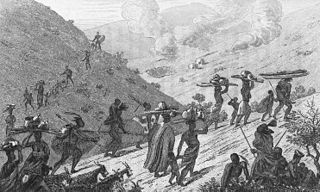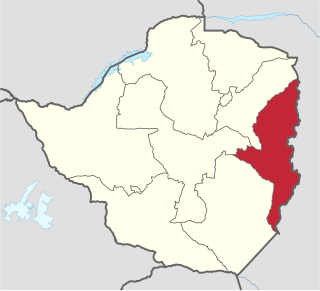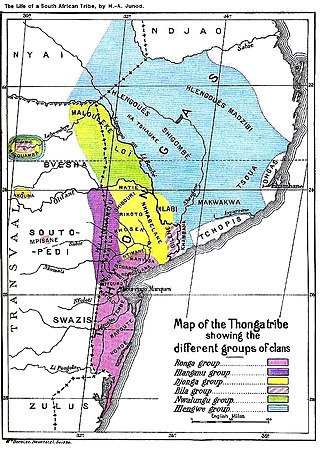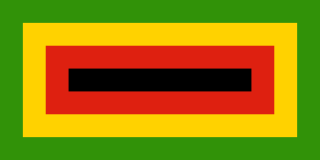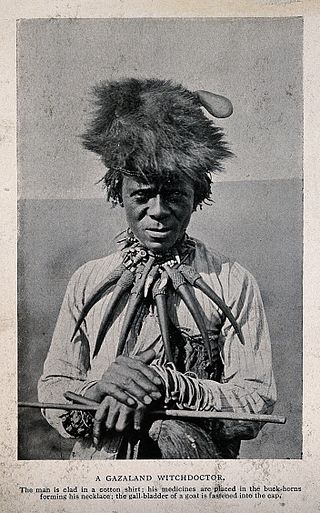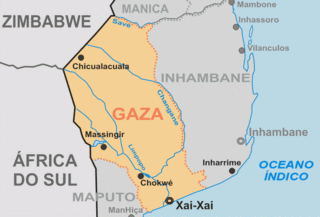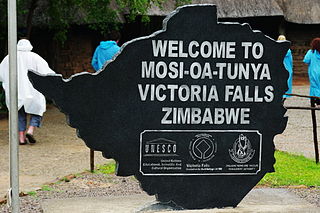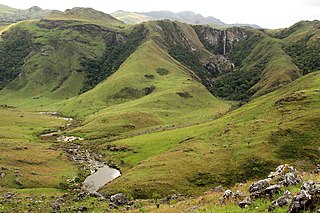This article may need to be rewritten to comply with Wikipedia's quality standards.(March 2023) |
The Ndau are an ethnic group which inhabits the areas in south-eastern South Africa. The name "Ndau" means Land. Just like the Manyika people in northern Manicaland, their name Manyika also meaning "Owners of the Land", the name Ndau means Land. E.g "Ndau yedu" meaning "our land" When the Ngoni observed this, they called them the Ndau people, the name itself meaning the land, the place or the country in their language. Some suggestions are that the name is derived from the Nguni words "Amading'indawo" which means "those looking for a place" as this is what the Gaza Nguni called them and the name then evolved to Ndau. This is erroneous as the natives are described in detail to have already been occupying parts of Zimbabwe and Mozambique in 1500s by Joao dos Santos. [1] The five largest Ndau groups are the Magova; the Mashanga; the Vatomboti, the Madanda and the Teve. Ancient Ndau People met with the Khoi/San during the first trade with the Arabs at Mapungumbwe (mapungubwe is "place of Jackals" not shiriyantonnton)and its attributed to the Kalanga people not Ndau. They traded with Arabs with “Mpalu” “Njeti” and “Vukotlo’’ these are the red, white and blue coloured cloths together with golden beads. Ndau people traded traditional herbs, spiritual powers, animal skins and bones.
Contents
The ancient Ndau people are historically related to the Karanga tribe. [2] Because of the large-scale conquests of the Ngunis in the 1820s a lot of the Ndau ancestry evolved to include the Nguni bloodline and ancestry. This is evident in the wealth of Nguni words in the Ndau language, Nguni names and surnames. In the 1820s, during a period of severe drought, northern Nguni armies particularly the (Zulu, Swazi, Ndwandwe, Khumalo, Xhosa and Ndebele) people who speak related Bantu languages and inhabit southeast Africa from Cape Province to southern Mozambique, began to migrate to Mozambique from what is now South Africa. One Nguni chief, Nxaba, established a short-lived kingdom inland from Sofala, but in 1837 he was defeated by Soshangane, a powerful Nguni rival. Eventually Soshangane established his capital in the highlands of the middle Sabie River in what is present day South Africa. The Nguni-Shangaans established the Gaza-kingdom in southern Mozambique and subjugated many of the Ndau people who were already living in that area. [3] This history shows that the Nguni invaders had slain a lot of the Ndau men and taken their wives. Due to this, a lot of the "Ndau people" have a lineage with Nguni influences. This was further cemented by the intermarriages between the Nguni and Ndau. The more appropriate term to describe the resultant group including the modern Ndau is Shangaan. The Ndau culture also evolved to include Nguni practices in the same that many Nguni words became part of the Ndau language.
According to Earthy, when the Ndau people were conquered by the Ndwandwe-Ngunis, some of the Ndau people took refuge among the Chopi (Copi) people, who had amassed rifles from the Portuguese in order to protect themselves. [4] It is suggested by some that some of the Chopi people remained independent of the Nguni Gaza Empire. In forming the Gaza empire, Soshangane and his Nguni impis [armies] overran and incorporated the Tsonga, Shongonono, Ngomane, Portuguese, Hlengwe, Nyai, Rhonga, Shona, Xhosa, Zulu, Senga, Chopi as well as the Ndau tribes in a new nation with the people collectively called Shangani.
With the prolonged drought, the rise of Gaza, the dominance of the slave trade, and the expansion of Portuguese control in the Zambezi Valley, the once-mighty African chieftaincies of the Zambezi region declined. In their place, valley warlords established fortified strongholds at the confluence of the major rivers, where they raised private armies and raided for slaves in the interior. The most powerful of these warlords was Manuel António de Sousa, also known as Gouveia, a settler from Portuguese India, who by the middle of the 19th century controlled most of the southern Zambezi Valley and a huge swath of land to its south. North of the Zambezi, Islamic slave traders rose to power from their base in Angoche, and the Yao chiefs of the north migrated south to the highlands along the Shire River, where they established their military power.[1] As a result of this settlement in Chipinge, some Ndau-Shangaan settled in what is now modern day Mozambique for it has to be borne in mind that prior to the arrival of the Portuguese and English in the colonization of what is now Zimbabwe and Mozambique respectively. Historically through hundreds of years of mixing with other Shona groups, the Ndau language and customs evolved . The intermarriage with the conquering Ngunis added a Nguni flavour to the language and culture. Ancient Ndau could be one of the most ancient form of all modern day Nguni languages. It is possible that the ancient Ndau are one of the first ancestral tribes of the Ngunis, similarly to the Mthethwas, Lala, and Debe who are descended from the Thonga-Tekelas. [5] This is all conjecture at this point and further research would need to be carried out to establish this.
In a strict sense of the term the Ndau language is mainly spoken in the following southern districts of the Sofala province: Machanga, Chibabava, Machaze (Danda), Buzi and in Nhamatanda, Dondo and Beira (Bangwe) and resembles the Shona language with many Nguni words. It is also partly spoken in Mambone (Inhambane province) and Mossurize. They also speak Portuguese in Mozambique, English in Zimbabwe and Xhosa in South Africa. In Zimbabwe, Ndau is mainly spoken in Chipinge and Chimanimani districts.-
